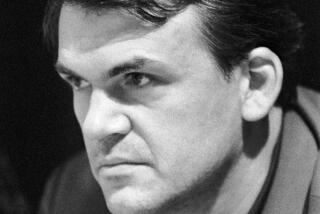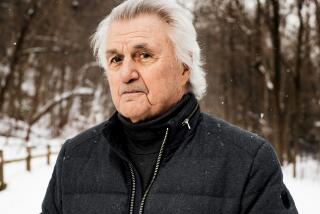And so it goes
FOR readers of a certain age and philosophical bent â and I count myself among them â Kurt Vonnegut was the writer who opened up the world. There was your life before Vonnegut, and then there was Vonnegut. Once you read him, it changed everything.
Part of the appeal, of course, was that Vonnegut â who died Wednesday night in New York at the age of 84 â was so much fun to read, a stunning contrast to what we thought of as literature. He could be so playful because he recognized that writing was an elaborate game. Thatâs not to say he didnât take it seriously; he did, as his more than 50-year career attests.
He told stories like no other writer, telegraphing his endings, interweaving autobiographical material. In his 1973 novel âBreakfast of Champions,â he wrote himself into the narrative, confronting his characters in the cocktail lounge of a Holiday Inn in middle America. âI was on a par with the Creator of the Universe,â he declared, âthere in the dark in the cocktail lounge. Â Ask me a question, any question. How old is the Universe? It is one half-second old, but that half-second has lasted one quintillion years so far. Who created it? Nobody created it. It has always been here.â
If this seems like merely an expression of the writerâs ego, Vonnegut had something else in mind. He finished the book by liberating those characters, particularly his alter ego, a science-fiction author named Kilgore Trout. âI am approaching my fiftieth birthday, Mr. Trout,â he noted in the closing pages of the novel. âI am cleansing and renewing myself for the very different sorts of years to come. Under similar spiritual conditions, Count Tolstoi freed his serfs. Thomas Jefferson freed his slaves. I am going to set at liberty all the literary characters who have served me so loyally during my writing career.â
He was born Nov. 11, 1922 â Armistice Day â and attended Shortridge High School in his hometown of Indianapolis, then went to Cornell University, where he majored in chemistry. During World War II, he served in the Army, then went to graduate school at the University of Chicago, later taking a public relations job at General Electric in the years after World War II. As a result, perhaps, he was suspicious of the notion that writers should study only literature. â[I]t would never occur to me,â he once wrote, in a gentle poke at Allen Ginsberg, âto look for the best minds of my generation in an undergraduate English department anywhere. I would certainly try the physics department or the music department first â and after that biochemistry.â
His first short story, âReport on the Barnhouse Effect,â published in Collierâs in 1950, was constructed as a mock official inquiry into a professor who could destroy weapons and military machinery by a mental process called â âdynamopsychismâ or force of the mind.â His 1952 debut novel, âPlayer Piano,â painted an absurdist portrait of industrialization and its discontents at a company very much like GE.
Because this was not the kind of material so-called literary writers were producing, Vonnegut was marginalized, labeled a science-fiction writer, his books relegated to the status of paperback originals, published cheaply and quickly out of print. It was not until after the 1963 publication of âCatâs Cradleâ â the funniest end-of-the-world novel ever written â that he found himself on the cusp of broad acceptance, although even that would have to wait a few more years, until âSlaughterhouse-Fiveâ came out in 1969 and made Vonnegut a household name.
âSlaughterhouse-Five,â Vonnegutâs masterpiece, is the story of a World War II veteran named Billy Pilgrim who comes unstuck in time. The book is centered around the firebombing of Dresden, Germany, by Allied forces near the end of World War II, which Vonnegut survived as a prisoner of war. Itâs no understatement to suggest that this was the defining experience of the authorâs life, not because it made him bitter but because it opened up his point of view.
Close to 100,000 people died in Dresden, almost all of them civilians: shopkeepers, nursemaids, teachers, children. It was a horror so incomprehensible that the only reasonable response was to see it as absurd. For Vonnegut, this was the linchpin in what became a humanistic outlook on the world. It allowed him, in some fundamental way, to develop his own odd bittersweet sense of humor, since he had witnessed such indiscriminate devastation and despair.
What set Vonnegut apart is that, even as he commented on this, he understood there was nothing to be done about it; when he acknowledged, in response to a question from an acquaintance, that he was writing an antiwar book, he was asked why he wasnât writing an anti-glacier book instead. âWhat he meant, of course,â Vonnegut wrote, âwas that there would always be wars, that they were as easy to stop as glaciers. I believe that, too.â
He was also smart enough to recognize his complicity, the idea that as a writer or observer, he was not above the fray. âOne way or another,â Vonnegut acknowledged ruefully in 1976, âI got two or three dollars for every person killed [in Dresden]. Some business Iâm in.â
This willingness to tell the truth would sometimes blur, as Vonnegut grew older, into cynicism. He could be a misanthrope; in his 1991 essay collection âFates Worse Than Death,â he described humanity as âan unstoppable glacier made of hot meat, which ate up everything in sight and then made love, and then doubled in size again,â and later he would go so far as to say that we, as a species, had been a mistake.
Indeed, much of his later work was marked by a pessimism about the fate of the world and, indeed, the human race. âThe good Earth â we could have saved it, but we were too damn cheap and lazy,â he wrote in his last book, âA Man Without a Country,â published in 2005.
Still, even the existence of that final effort spoke to an opposing, and more optimistic, point of view. Vonnegut, after all, had very publicly retired from writing after the release of his 14th and final novel, âTimequake,â in 1997. And yet he couldnât keep away from the language, from communicating, from commenting on society, on the culture.
Much of âA Man Without a Countryâ was drawn from a series of columns he had written for the progressive magazine In These Times, as well as from speeches and commencement addresses. That he remained a popular draw tells us something about the role he played â that of a teacher, of someone who had important information to offer and, more important, could frame it in such a way as to be heard.
Vonnegut did that. He wrote like an angel in plain English, telling stories that, like existence, had no beginning and no end. He understood that the real action took place between the lines, in the interstices, that the only thing we had to offer was the truth. For him, that truth was gently existential, not whimsical exactly but resigned.
âRobert Kennedy, whose summer home is eight miles from the home I live in all year round, was shot two nights ago,â he wrote, in his own voice, in the closing pages of âSlaughterhouse-Five.â âHe died last night. So it goes.
âMartin Luther King was shot a month ago. He died, too. So it goes.
âAnd every day my Government gives me a count of corpses created by military science in Vietnam. So it goes.
âMy father died many years ago now â of natural causes. So it goes. He was a sweet man. He was a gun nut, too. He left me his guns. They rust.â
What Vonnegut was saying is we are all here on a temporary pass. And yet, like Albert Camus, whom he once described as his favorite Nobel Prize winner, he recognized that the only moral choice in the face of an absurd universe is to be a force for good. âSo you see,â a character in his story âWelcome to the Monkey Houseâ says, âI have spent this night, and many others like it, attempting to restore a certain amount of innocent pleasure to the world, which is poorer in pleasure than it needs to be.â
Words to live by â even more so, now that he is gone.
David L. Ulin is book editor of The Times.
More to Read
The biggest entertainment stories
Get our big stories about Hollywood, film, television, music, arts, culture and more right in your inbox as soon as they publish.
You may occasionally receive promotional content from the Los Angeles Times.











